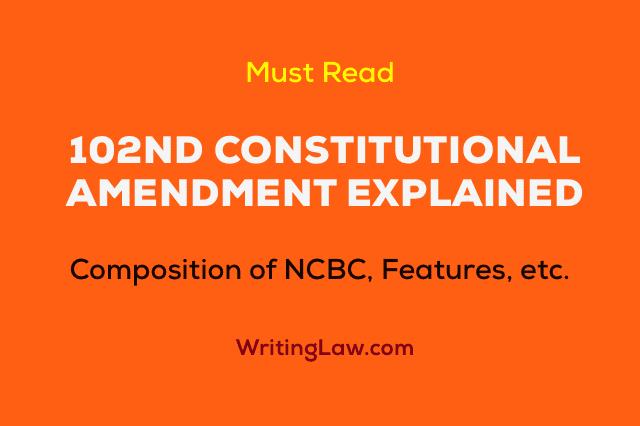
Introduction and Background of NCBC
Kelkar Commission: The idea of the National Commission for Backward Classes was derived from the Kaka Kelkar Commission on 29 January 1953.
Mandal Commission: Being dissatisfied with the approach of the Kelkar Commission in determining the criteria required for the identification of backward class, the President of India appointed the Mandal Commission on 1 January 1979. Afterwards, in the 65th Amendment of the Constitution, Article 338 was introduced, by which a constitutional body was set up for SC & ST.
- Introduction
- Case Law
- Composition of NCBC
- Constitutional Provisions for Backward Classes
- Features of the 102nd Constitutional Amendment Act
- Maratha Quota Case Law
Case Law
Indra Sawhney & Ors. vs Union of India, 1992
This is the landmark judgement where the apex court had opined to set up a permanent body for backward classes, after which the Parliament set up a statutory body by passing a National Commission for Backward Classes Act, 1993.
After the 89th Amendment of the Indian Constitution, which inserted Article 338A, constitutionalised the NCST (National Commission for Scheduled Tribes).
Later 123rd Amendment Bill and the 102nd Amendment Act were passed by the Indian Parliament in August 2018, which renamed the earlier Commission as NCBC (National Commission for Backward Classes).
Composition of NCBC
The National Commission for Backward Classes shall consist of five members to be nominated by the Central Government, including a Chairperson who is/was a judge of the Supreme Court or High Court, another two members having specialist knowledge with respect to backward classes, a social expert and a member secretary who is/was secretary for Central Government.
Constitutional Provisions for Backward Classes
- Article 15(1)
- Article 15(4)
- Article 16(4)
- Article 340
- Article 338B
Features of the 102nd Constitutional Amendment Act
- The Bill was introduced in the Lok Sabha on 5 April 2017 and passed on 2 August 2018.
- Rajya Sabha passed the Bill on 8 August 2018.
- The President gave his assent to the Bill on 11 August 2018.
- The Bill granted Constitutional Status to NCBC (National Commission for Backward Classes).
- The 102nd Constitutional Amendment Act introduced the following articles into the Indian Constitution.
- Article 338B: Deals with Structure, Duties and Powers of NCBC (National Commission for Backward Classes).
- Article 342A clause 1: Empowers the President to notify the list of SEBC (Socially Economic and Backward Classes for each State and Union Territory in consultation with the Governor.
- Article 342A clause 2: Empowers the Parliament to amend the Central List.
- The Bill has brought changes in Article 366.
Maratha Quota Case Law
Dr Jaishree Laxmanrao Patil vs Chief Minister of Maharashtra & Others
This is an important recent case law where the five-judge bench of the apex court upheld the 102nd Constitutional Amendment Act by a 3:2 majority. This case law is related to Maratha Reservation. However, the apex court had stated that States could make suggestions to the President or Commission under Article 338B for modification of castes/communities in the list to be published under Article 342A clause 1.
The apex court had also reasoned that the amendment of the Indian Constitution does not in any manner violate the essential features nor the basic structure of the Constitution.
Issues
- After the amendments, the Commission is unlikely to provide justice.
- The new composition of NCBC (National Commission for Backward Classes) is not according to the characteristics of the expert panel as suggested by the apex court.
- Granting Constitutional status and amending the act will not address the issues at the grassroots level.
- Recommendations of the committee are not binding on the reporting authority.
- The amendments and acts, including the Constitution of India, are silent on the revision of lists in a periodic manner.
Conclusion
Corruption and reservation are the two major issues that need to be addressed to make India a developed country. The caste-based reservation is a bottleneck in enjoying equality, as enshrined in the Constitution of India.
Even the father of the Constitution, Dr. B.R. Ambedkar, opposed the caste system. The caste-based reservation has given rise to corruption, like applicants relying upon counterfeit documents to avail of the benefits.
There is no doubt that the caste-based reservation is misused heavily, resulting in different problems like meritorious individuals failing to avail the opportunity. Experts say that the reservation for the EWS (Economical Weaker Section) is a blessing in disguise.
Until the caste-based reservation is eradicated, the development of India will remain in dreams.
Read Next: What Is Election Law Amendment Act, 2021 and Its Pros and Cons
- 10 Types or Kinds of Jurisdiction of Indian Courts - 13th April 2022
- Malicious Charge of Offence Under Section 211 of the Indian Penal Code - 17th March 2022
- About Supreme Court of India – Collegium, Powers, Judges - 7th February 2022







